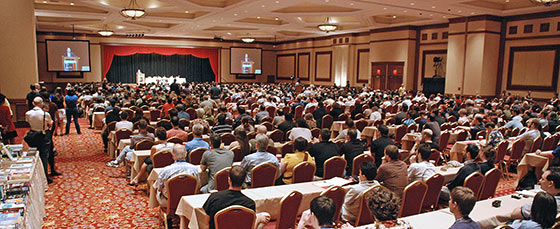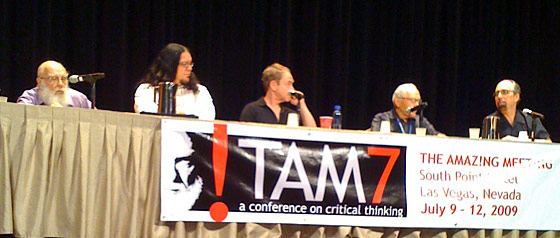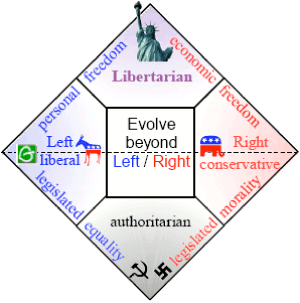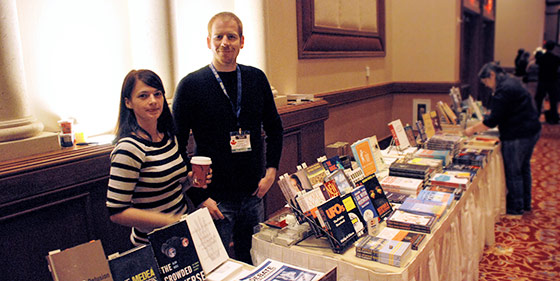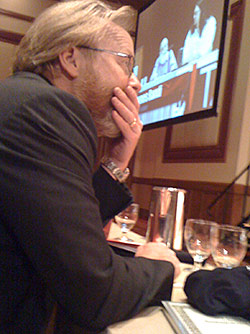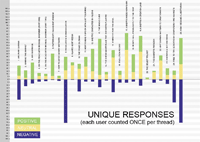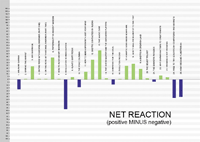In reading through the many critical comments in response to my occasional foray into issues political and economic, readers seem to think that there are two Michael Shermers: Mr. Rational Skeptic and Mr. Kooky Libertarian. I will respond to the specific comments, but let me say at the outset that I do appreciate your skepticism of my libertarian beliefs (hey, we should be skeptical of the skeptics, or else we’re not true skeptics, right?!). Perhaps if I provided some background to how I became a Libertarian you can see that there is just one Michael Shermer, and even if you still disagree with my economics, you’ll at least understand where I’m coming from. And do remember that we libertarians are social liberals just like you (I’m presuming that the vast majority of readers of Skeptic, eSkeptic, and Skepticblog are liberals, which itself is a troubling bias in our readership that I’ll address another time). In the meantime…
In the mid-1970s I was an undergraduate at Pepperdine University, a Church of Christ institution with a strong conservative bent at a time when liberals ruled academe. I matriculated there because I was an evangelical Christian who wanted to be a college professor, so theology seemed like the most appropriate field and Pepperdine had a strong theology department (it didn’t hurt that the campus is located in the majestic Malibu hills overlooking the Pacific Ocean). But I soon discovered that in order to earn a Ph.D. in theology one had to master four dead languages — Hebrew, Greek, Latin, and Aramaic — and since I found even Spanish to be taxing, this made my career choice problematic. When my advisors also warned me about the questionable university job market for theologians, I switched to psychology, where I discovered the language of science, which I both enjoyed and mastered. Theology is based on logical analysis, philosophical disputation, and literary deconstruction. Science is founded on empirical data, statistical analysis, and theory building. To me, the latter seemed like a better method to tell the difference between what is real and what is not, what works and what doesn’t, and in any case meshed will with my cognitive style of thinking — for whatever reason, I can sort through data sets and scientific charts much better than I can logical syllogisms and thought experiments.
My introduction to economics came in my senior year when many of the students in the psychology department were reading a cinderblock of a book entitled Atlas Shrugged, by the novelist-philosopher Ayn Rand. I had never heard of the book or the author, and the novel’s size was so intimidating that I refused to join the ranks of the enthused for months, until social pressure pushed me into taking the plunge. I trudged through the first hundred pages (patience was strongly advised) until the gripping mystery of the man who stopped the motor of the world swept me through the next thousand pages.
I found Atlas Shrugged to be a remarkable book, as so many have. In fact, in 1991 the Library of Congress and the Book of the Month Club surveyed readers about books that “made a difference” in their lives. Atlas Shrugged was rated second only to the Bible.1 What scientist or scholar wouldn’t find resonance with proclamations such as this: “Man cannot survive except by gaining knowledge, and reason is his only means to gain it. Reason is the faculty that perceives, identifies and integrates the material provided by his senses. The task of his senses is to give him the evidence of existence, but the task of identifying it belongs to his reason, his senses tell him only that something is, but what it is must be learned by his mind.”2 Rand’s philosophy of Objectivism was so compelling that it took me two decades to discover what I consider to be the shortcomings in its founding principles, which Rand once outlined (“while standing on one foot”) as: 1. Metaphysics: Objective Reality; 2. Epistemology: Reason; 3. Ethics: Self-interest; 4. Politics: Capitalism.3 I am most troubled by Rand’s theory of human nature as wholly selfish and competitive, defined in Atlas through the famous “oath” pronounced by the novel’s heroes: “I swear — by my life and my love of it — that I will never live for the sake of another man, nor ask another man to live for mine.” Science now shows us that, in fact, in addition to being selfish, competitive, and greedy, we also harbor a great capacity for altruism, cooperation, and charity, the evidence for which is now overwhelming from a variety of fields from anthropology to neuroscience. But reading Rand, and absorbing the logic of her case for economic freedom and political liberty (she called herself a “radical for capitalism”), led me to the extensive body of work on the science of markets and economies and the philosophy of liberty and freedom, all of which resonated deeply with my personality and temperament.
I cannot say for certain whether it was the merits of free market economics and fiscal conservatism (which are considerable) that convinced me of its veracity, or if it was my disposition that reverberated so well with its cognitive style. As it is for most belief systems we hold, it was probably a combination of both. I was raised by parents who could best be described as fiscally conservative and socially liberal, which today would be called libertarian, but there was no such label when they were coming of age in the 1940s and 1950s. Products of the depression and motivated by the fear of returning to abject poverty, my parents skipped college and worked full time well into their later years. Throughout my childhood I was inculcated with the fundamental principles of economic conservatism: hard work, personal responsibility, self-determination, financial autonomy, small government, and free markets. Even though they were not in the least religious (as so many conservatives are today), my parents were exceedingly generous to those who were less fortunate — greed is good, but so too is charity.
After Pepperdine, I began a graduate program in experimental psychology at California State University, Fullerton, by which time I had abandoned my religious faith and embraced in its stead the secular values of the Enlightenment and the rigorous methods and provisional truths of science.4 But after two years of enticing rats to press bars in proportion to the frequency and intensity of the reinforcements we gave them, my enthusiasm for practicing this type of science waned while my wonderlust for the real world waxed.5 I went to the campus career development office and inquired what I might do for a living with a Master’s degree. “What are you educated to do?” they inquired. “Train rats,” I replied sardonically. “What else can you do?” they persisted. “Well,” I searched, “I can research and write.” The employment book included a job description for research and writing at Bicycle Dealer Showcase, the trade magazine of the bicycle industry, about which I knew nothing. My first assignment was to attend a press conference hosted by Cycles Peugeot and Michelin Tires in honor of John Marino, a professional bicycle racer who broke the transcontinental record from Los Angeles to New York. I fell in love with the sport, entering my first race that weekend, and for the next two years I learned the business of publishing and the sport of cycling. I wrote articles, sold advertisements, and rode my bike as far and as fast as I could. At the end of 1981 I left the magazine to race full time, supported by corporate sponsors and an adjunct professor’s salary from teaching psychology at Glendale College.
One day in 1981, Marino and I were on a long training ride during which he told me about Andrew Galambos, a retired physicist teaching private courses through his own Free Enterprise Institute, under an umbrella field he called “Volitional Science.” The introductory course was called V-50. This was Econ 101 on free market steroids, an invigoratingly muscular black-and-white world where Adam Smith is good, Karl Marx bad; individualism is good, collectivism bad; free economies are good, mixed economies are bad. The course was popular in Orange County, California (labeled by our neighbors in L.A. County as the “Orange Curtain”), and the time was right with Ronald Reagan as President and conservatives on the ascendant. Where Rand advocated for limited government, Galambos proffered a theory in which everything in society would be privatized until government simply falls into disuse and disappears. Galambos defined freedom as “the societal condition that exists when every individual has full (i.e. 100%) control over his own property,” and a free society as one where “anyone may do anything that he pleases — with no exceptions — so long as his actions affect only his own property; he may do nothing which affects the property of another without obtaining consent of its owner.” Galambos identified three types of property: primordial (one’s life), primary (one’s thoughts and ideas), and secondary (derivatives of primordial and primary property, such as the utilization of land and material goods). Thus, Galambos defined capitalism as “that societal structure whose mechanism is capable of protecting all forms of private property completely.” To realize a truly free society, then, we have merely “to discover the proper means of creating a capitalist society.” In this free society, we are all capitalists.6
Galambos had a massive ego that propelled him to a successful career as a private lecturer, but led him to such ego-inflating pronouncements as his classification of all sciences into physical, biological, and his own “volitional sciences.” His towering intellect took him to great heights of interdisciplinary creativity, but often left him and his students tangled up in contradictions, as when we all had to sign a contract promising that we would not disclose his ideas to anyone, while we were also inveigled to solicit others to enroll. (“You’ve got to take this great course.” “What’s it about?” “I can’t tell you.”) And he had a remarkable ability to lecture for hours without notes in an entertainingly colloquial style, but when two hours stretched into three, and three hours dragged into four, his audiences were never left wanting for more. Most problematic, however, was any hope of translating theory into practice, which is where the rubber meets the road for any economic or political principle. Property definitions are all well and good, but what happens when we cannot agree on property rights infringements? The answer was inevitably something like this: “in a truly free society all such disputes will be peacefully resolved through private arbitration.” Sounds good in theory, but turning theory into practice is never as easy as it sounds in the theory stage.
Nevertheless, I stuck it out to the end, learning more in that one course than I learned in dozens of college courses, absorbing the principles and attempting to apply them in both the academic and business worlds, which I straddled for many years. Marino and I (and our cycling partner Lon Haldeman) turned our cycling passion into a business by founding Race Across America, Inc., with corporate sponsors and a contract from ABC Sports, as well as the nonprofit sanctioning body, Ultra-Marathon Cycling Association. Several appearances on Wide World of Sports gave me the additional recognition and confidence to open Shermer Cycles, a bicycle shop in Arcadia, California. Meanwhile, I expanded my teaching duties by creating new courses in evolutionary theory and the history of ideas at Glendale College.7
Galambos had a protégé named Jay Stuart Snelson, whom I met shortly after taking V-50. Snelson taught courses at the Free Enterprise Institute, but after a falling out with Galambos (a common occurrence in Galambos’ social sphere that also plagued Ayn Rand), Snelson founded his own Institute for Human Progress. To distance himself from Galambos, Snelson’s theory of a free market society was built on the shoulders of what is known as the Austrian School of Economics, most notably the work of the Austrian economist Ludwig von Mises. Mises’ most important work was Human Action, and Snelson’s course was self-consciously built upon it, as gleaned from its title, Principles of Human Action. Snelson demonstrated through a series of scientific principles and historical examples that free market capitalism is unquestionably the most effective means of “optimizing peace, prosperity, and freedom.” As Snelson explained, outlining the countless and varied governmental actions that attenuate freedom: “Freedom exists where the individual’s discretion to choose is not confiscated by interventionism. The free market exists where people have the unrestricted freedom to buy and sell.” Although thieves, thugs, muggers, and murderers confiscate our freedoms, congressmen, senators, governors, and presidents restrict our freedoms on a scale orders of magnitude greater than all private criminals combined. And they do so, Snelson showed, with the best of intentions, because they believe that the “confiscation of the people’s freedom to choose will achieve the greatest satisfaction for the greatest number.” With such good intentions, and the political power to enforce them, states have intervened in business, education, transportation, communications, health services, environmental protection, crime prevention, free trade overseas, and countless other areas.
How these services could all be successfully privatized was the primary thrust of Snelson’s work. He believed that the social system that optimizes peace, prosperity, and freedom is one “where anyone at any time can choose to produce or provide any product or service, hire any employee, choose any production, distribution, or sales site, and offer to sell products or services at any price.” The only allowable restrictions are from the market itself. So employed, systematically throughout the world, a free market society would, as a plaque posted at the Panama Canal (that also served as the Institute’s motto) proclaims, Aperire Terram Gentibus, “to open the world to all people.”
These were heady words for a heady time in my life before formal commitments to career and family were congealed. For several years I taught Snelson’s principles course, along with my own courses on the history of science and the history of war. I also developed a monthly discussion group called the “Lunar Society” — after the famous 18th-century Lunar Society of Birmingham — centered on books such as Human Action. As a social scientist in search of a research project, I accepted Ludwig von Mises’ challenge: “One must study the laws of human action and social cooperation as the physicist studies the laws of nature.” We were going to build a new science, and out of that science we would build a new society. I even penned a “Declaration of Freedom” and a speech entitled “I have a Dream II.” What could be grander?!
Well, as Yogi Berra once said: “In theory, there is no difference between theory and practice. In practice there is.” I soon discovered that Berra’s principle applies in spades to the economic sphere. We live in a world rather different from that envisioned by my visionary mentors, so I turned my attention to the writings of economists from the Austrian School, and their protégés at the University of Chicago, who were decidedly becoming more mainstream in the 1980s as the country began a systematic shift toward the right.
In 1987 I decided that if I wanted to make an impact on the world through ideas I was going to have to give up my competitive cycling career and complete my graduate studies. I switched fields from psychology to the history of science, and in 1991 I graduated from Claremont Graduate School with a Ph.D., the union card and entrée into academe and professional science. I began teaching at Occidental College, a prestigious four-year liberal arts college in Los Angeles, where I discovered that 1960’s-style liberalism was still thriving. As a young faculty member without tenure, I kept my libertarian mouth shut, and on the weekends joined Jay Snelson in teaching seminars on free market economics at his Institute.
Through Snelson’s institute, and the ideas proffered by the Austrian and Chicago schools, I found a scientific foundation for my economic and political preferences. The founders of the Austrian and Chicago schools of economics penned a number of books and essays whose ideas burned into my brain a clear understanding of right and wrong human action in the sphere of economics. One especially influential essay on my thinking was the wickedly raffish The Petition of the Candlemakers, by Frédéric Bastiat, in which the French economist and social commentator satirizes special interest groups, in this case candlemakers, who petition the government for special favors:
We are suffering from the ruinous competition of a foreign rival who apparently works under conditions so far superior to our own for the production of light, that he is flooding the domestic market with it at an incredibly low price…. This rival … is none other than the sun…. We ask you to be so good as to pass a law requiring the closing of all windows, dormers, skylights, inside and outside shutters, curtains, casements, bull’s-eyes, deadlights and blinds; in short, all openings, holes, chinks, and fissures.
Bastiat also taught me the difference between what is seen and what is not seen when governments intervene in the marketplace. A public-works bridge, for example, is seen by all and appreciated by its users; what is not seen are all the products that would have been produced by the monies that were taxed out of private hands in order to finance the public project. It is not just that individual liberties are violated whenever governments interfere with freedom of choice in the economic realm, but that, in fact, the net result is a loss not just for the individuals, but for the collective for which the government action was originally intended.
I read Friedrich Hayek’s The Constitution of Liberty and The Road to Serfdom, I absorbed Henry Hazlitt’s Economics in One Lesson, an exceptional summary of free market economics, and I found Milton Friedman’s Free to Choose to be one of the clearest expositions of economic theory ever penned, and his PBS documentary series by the same name — introduced by the most muscular libertarian in history, Arnold Schwarzenegger — was so powerful that I purchased the series on video and watched the episodes over and over. And first among equals in the giants of libertarian thought who most shaped my thinking was Ludwig von Mises, the spiritus rector of the modern libertarian movement, most notably his magisterial work Human Action.8 Mises’ story is as instructive as it is inspirational. Mises was born in 1881 within the then powerful Austro-Hungarian Empire, and studied law and economics at the University of Vienna under Friedrich von Wieser and Eugen von Böhm-Bawerk, both followers of Carl Menger, the founder of the Austrian School of Economics. After serving as an artillery officer on the Russian front in World War I, Mises earned international recognition for his first major book, Socialism, where he spelled out the problems with “economic calculation” in a planned socialist economy. In capitalism, prices are determined from below by individuals freely exchanging in the marketplace and are in constant flux; in socialism, prices are determined from above by government fiat and are slow to change. In fact, Mises demonstrated that socialist economies depend on capitalist economies to determine what prices should be assigned. And they do so cumbersomely.9
In March, 1938, Hitler marched into Vienna, and Mises promptly marched out to the United States, where he began his long and lonely struggle against economic and political tyranny, a lone advocate of freedom in an increasingly socialistic society. The problem, Mises argued, is that interventionism leads to more interventionism. If you can intervene to protect individuals from dangerous drugs, for example, what about dangerous ideas? The following passage resonated with me because his analogue from the physical to the ideological is so effective in conveying the central message of freedom and liberty:
Opium and morphine are certainly dangerous and habit forming drugs. But once a principle is admitted that it is the duty of government to protect the individual against his own foolishness, no serious objections can be advanced against further encroachments. A good case could be made out in favor of the prohibition of alcohol and nicotine. And why limit the government’s benevolent providence to the protection of the individual’s body only? Is not the harm a man can inflict on his mind and soul even more disastrous than bodily evils? Why not prevent him from reading bad books and seeing bad plays, from looking at bad paintings and statues and from hearing bad music?10
At the end of almost 900 pages of mind-opening economic revelations, Mises concludes Human Action triumphantly:
The truth is that capitalism has not only multiplied population figures but at the same time improved the people’s standard of living in an unprecedented way. Neither economic thinking nor historical experience suggest that any other social system could be as beneficial to the masses as capitalism. The results speak for themselves. The market economy needs no apologists and propagandists. It can apply to itself the words of Sir Christopher Wren’s epitaph in St. Paul’s: Si monumentum requires, circumspice. [“If you seek his monument, look around.”]11
Although capitalism may not need apologists and propagandists, it does need a scientific foundation. In this sense, then, my entire career has been building toward this project, and my tenth book, The Mind of the Market, lays down a scientific foundation for capitalism through three new sciences: behavioral economics, neuroeconomics, and evolutionary economics. It is my goal now to continuing construction on the libertarian edifice, and perhaps one day even attempt to translate theory into practice through politics … libertarian politics of course.
Endnotes
-
^ After the Bible and Atlas Shrugged were The Road Less Traveled by M. Scott Peck, To Kill a Mockingbird by Harper Lee, The Lord of the Rings by J.R.R. Tolkien, Gone With the Wind by Margaret Mitchell, How to Win Friends and Influence People by Dale Carnegie, The Book of Mormon, The Feminine Mystique by Betty Friedan, A Gift from the Sea by Anne Morrow Lindbergh, Man’s Search for Meaning by Victor Frankl, Passages by Gail Sheehy, and When Bad Things Happen to Good People by Harold S. Kushner.
-
^ Rand, Ayn. 1957. Atlas Shrugged. New York: Random House, p. 1016.
-
^ In my 1997 book, Why People Believe Weird Things, I devoted a chapter to the cult-like following that developed around Rand and her philosophy (“The Unlikeliest Cult in History” I called it), in an attempt to show that extremism of any kind, even the sort that the eschews cultish behavior, can become irrational. I cited the description of Rand’s inner circle by Nathaniel Branden, Rand’s chosen intellectual heir, where he listed the central tenets to which followers were to adhere, including: “Ayn Rand is the greatest human being who has ever lived. Atlas Shrugged is the greatest human achievement in the history of the world. Ayn Rand, by virtue of her philosophical genius, is the supreme arbiter in any issue pertaining to what is rational, moral, or appropriate to man’s life on earth. No one can be a good Objectivist who does not admire what Ayn Rand admires and condemn what Ayn Rand condemns. No one can be a fully consistent individualist who disagrees with Ayn Rand on any fundamental issue.” (Branden, Nathaniel. 1989. Judgment Day: My Years With Ayn Rand. Boston: Houghton Mifflin, pp. 255-256.) Many of the characteristics of a cult, in fact, seemed to fit what the followers of Objectivism believed, most notably veneration of the leader, belief in the inerrancy and omniscience of the leader, and commitment to the absolute truth and absolute morality as defined by the belief system.
-
^ My religious conversion and deconversion are recounted in Shermer, Michael. 2000. How We Believe: Science, Skepticism, and the Search for God. New York: Henry Holt/Times Books.
-
^ Shermer, Michael. 1978. Choice in Rats as a Function of Reinforcer Intensity and Quality. “A Thesis Presented to the Faculty of California State University, Fullerton, in Partial Fulfillment of the Requirements for the Degree Master of Arts in Psychology.” I was testing the “matching law,” which predicts that organisms will apportion behaviors in direct relation to payoffs; in our experiment, for example, a 16 percent sucrose reinforcement (sugar water) on the left bar should produce twice as many bar presses as the 8 percent sucrose reinforcement on the right bar. It almost did, requiring a slight modification to the matching law equation. I had a hard time seeing how I was going to change the world doing this kind of science.
-
^ Galambos never published his long-promised book in his lifetime, so my summary of his theory comes from my own extensive notes from the V-50 class, and a series of three-by-five leaflets he printed called “Thrust for Freedom,” numbered sequentially and presenting the definitions quoted here. In 1999, Galambos’ estate issued Vol. 1 of Sic Itur Ad Astra (The Way to the Stars), a 942-page tome published by The Universal Scientific Publications Company, Inc. Galambos’ dream was to be a space entrepreneur and fly customers to the moon. In his logic, in order to realize this dream he believed that space exploration had to be privatized, which meant that society itself, in its entirety, would have to be privatized.
-
^ I recount my cycling experiences and the founding of the Ultra-Marathon Cycling Association and the Race Across America in: Shermer, Michael. 1985. Sport Cycling. Chicago: Contemporary Books; and in Shermer, Michael. 1989. Race Across America: the Agonies and Glories of the World’s Longest and Cruelest Bicycle Race. Waco, TX: WRS Publishing.
-
^ Bastiat, Frédéric. 1995. “The Petition of the Candlemakes” and “What is Seen and What is Not Seen,” in Selected Essays on Political Economy. George B. de Huszar, ed. Irvington-on-Hudson, N.Y.: Foundation for Economic Education.
Hayek, F. A. 1944. The Road to Serfdom. Chicago: University of Chicago Press.
Hayek, F. A. 1960. The Constitution of Liberty. Chicago: University of Chicago Press.
Hazlitt, Henry. 1946 (1979). Economics in One Lesson. New York: Harper and Brothers.
Friedman, Milton. 1980. Free to Choose: A Personal Statement. New York: Harcourt.
Mises, Ludwig von. 1949 (1966). Human Action, 3rd ed. Chicago: Contemporary Books.
-
^ Mises, Ludwig von. 1981. Socialism. Indianapolis: Liberty Classics. See also: Rothbard, Murray. 1980. The Essential Ludwig von Mises. Auburn, AL: The Ludwig von Mises Institute of Auburn University.
-
^ Ibid., p. 860.
-
^ Ibid., p. 854.


